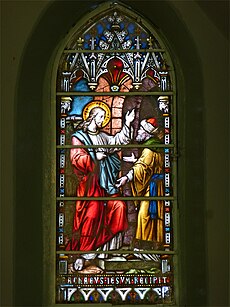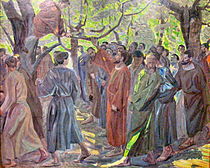Zacchaeus
Zacchaeus | |
|---|---|
 The Tax Collector and Bishop of Caesarea | |
| Bishop of Caesarea | |
| Hometown | Jericho |
| Residence | Caesarea |
| Died | 1st or 2nd century Caesarea |
| Venerated in | Roman Catholic Church Orthodox Church |
| Canonized | Pre-Congregation |
| Feast | 20 April |
| Attributes | Bearded man holding a sycamore branch |
Zacchaeus (sometimes spelled Zaccheus; Ancient Greek: Ζακχαῖος, Zakchaîos; Classical Syriac: ܙܰܟ݁ܰܝ, romanized: Zakay, "pure, innocent")[1] was a chief tax-collector at Jericho in the Bible. He is known primarily for his faith in climbing a sycamore tree to see Jesus and also his generosity in giving away half of all he possessed.[2]
A descendant of Abraham, he was an example of Jesus's personal, earthly mission to bring salvation to the lost.[3] Tax collectors were despised as traitors (working for the Roman Empire, not for their Jewish community), and as being corrupt. His story is found in the Gospel of Luke.[4]
Because the lucrative production and export of balsam was centered in Jericho, his position would have carried both importance and wealth.[5][6] In the account, he arrived before the crowd who were later to meet with Jesus, who was passing through Jericho on his way to Jerusalem. He was short in stature and so was unable to see Jesus through the crowd (Luke 19:3). Zacchaeus then ran ahead and climbed a sycamore tree along Jesus's path. When Jesus reached the spot he looked up at the sycamore tree (actually a sycamore-fig Ficus sycomorus[7]), addressed Zacchaeus by name, and told him to come down, for he intended to visit his house. The crowd was shocked that Jesus, a religious teacher/prophet, would sully himself by being a guest of a sinner.
Later traditions
[edit]
At Er-riha (Jericho) there is a large, venerable looking square tower, which by tradition is named the House of Zacchaeus.[citation needed][dubious – discuss]
Clement of Alexandria refers once to Zacchaeus in a way which could be read as suggesting that some identified him with apostle Matthew or Matthias.[8] However, Luke indicates that Matthias was with Jesus in the beginning since the baptism of John (Acts 1:21–22). Because John preached the giving away of one's excess possessions in Luke 3:7–14, this could explain the generosity of Little Zacchaeus. John also told us that later, many of Jesus' disciples turned back and no longer followed him (John 6:60–66). The later Apostolic Constitutions identify "Zacchaeus the Publican" as the first bishop of Caesarea (7.46).
Medieval legend identified Zacchaeus with Saint Amadour, and held him to be the founder of the French sanctuary, Rocamadour.
Liturgical practices
[edit]
In Eastern Orthodox and Greek-Catholic Churches, the Gospel account of Zacchaeus is read on the penultimate Sunday of the Pre-Lenten Season preceding the start Great Lent, for which reason that Sunday is known as "Zacchaeus Sunday". It is the first commemoration of a new Paschal cycle. The account was chosen to open the Lenten season because of two exegetical aspects: Jesus's call to Zacchaeus to come down from the tree (symbolizing the divine call to humility), and Zacchaeus's subsequent repentance. On years when Pascha, and hence Lent, falls very early the Sunday of the Canaanite woman is dropped and the Sunday of Zaccheaus falls immediately before Great Lent. However in some Eastern churches of the Greek/Byzantine tradition, Zacchaeus Sunday is instead dropped, and does not form part of the Lental cycle for that year. In the Russian tradition Zacchaeus Sunday always immediately precedes Great Lent having exchanged places with the Sunday of the Canaanite Woman.
In Western Christianity, the gospel pericope concerning Zacchaeus is the reading for a Dedication of a Church or its anniversary. In Southern Bavaria, a red banner with a white cross may be flown outside a Church on its anniversary, which is consequently called the Zacchaeus flag.
Spiritual lessons
[edit]
The story of Zacchaeus is used by some[9] to illustrate the saying of Jesus: "Blessed are the pure of heart, for they shall see God" (Matthew 5:8), because the name Zacchaeus means 'pure'. Zacchaeus also becomes a contrast of character with the Rich Young Ruler (Luke 18:18–23). Both Zacchaeus and the Rich Young Ruler were wealthy men, but one was self-righteous and would not give up his possessions, while the other gave half of his possessions to feed the poor.[10]
See also
[edit]References
[edit]- ^ Milligan, Jim. "Lexicon :: Strong's G2195 - Zakchaios". Blue Letter Bible. Sowing Circle.
- ^ Luke 19:1–10
- ^ Warfield, Benjamin Breckinridge. "Jesus' Mission, According to His Own Testimony". Monergism. CPR Foundation.
- ^ Luke 19:1–10
- ^ Morris, Leon. Luke: An Introduction and Commentary. Wm. B. Eerdmans, 1988. p. 297.
- ^ Rudolf Stier (1861). The Words of the Lord Jesus. Vol. 4. Translated by William Burt Pope. p. 314.
- ^ "Bible Study Tools - Sycamore Definition and Meaning". www.biblestudytools.com. Salem Media Group. Retrieved 17 February 2018.
- ^ Stromata Book 4 Ch 6 The New Advent Translation says "It is said, therefore, that Zaccheus, or, according to some, Matthew, the chief of the publicans, on hearing that the Lord had deigned to come to him, said, Lord, and if I have taken anything by false accusation, I restore him fourfold;" but the Greek has 4.6.35.2 Ζακχαῖον τοίνυν, οἳ δὲ Ματθίαν φασίν, ἀρχιτελώνην, ἀκηκοότα τοῦ κυρίου καταξιώσαντος πρὸς αὐτὸν γενέσθαι, ἰδοὺ τὰ ἡμίση τῶν ὑπαρχόντων μου δίδωμι ἐλεημοσύνην φάναι, κύριε, καὶ εἴ τινός τι ἐσυκοφάντησα, τετραπλοῦν ἀποδίδωμι. ἐφ' οὗ καὶ ὁ σωτὴρ εἶπεν· can just about be read as "by some said to be Matthias")
- ^ Pastor Doug Bachelor, Study on the Wisdom of Jesus's teachings
- ^ "A Contrast of Character | Zacchaeus and the Rich Young Ruler". Archived from the original on 2014-05-13. Retrieved 2013-11-26.
 This article incorporates text from a publication now in the public domain: Easton, Matthew George (1897). "Zacchaeus". Easton's Bible Dictionary (New and revised ed.). T. Nelson and Sons.
This article incorporates text from a publication now in the public domain: Easton, Matthew George (1897). "Zacchaeus". Easton's Bible Dictionary (New and revised ed.). T. Nelson and Sons.
External links
[edit] Media related to Zacchaeus at Wikimedia Commons
Media related to Zacchaeus at Wikimedia Commons
